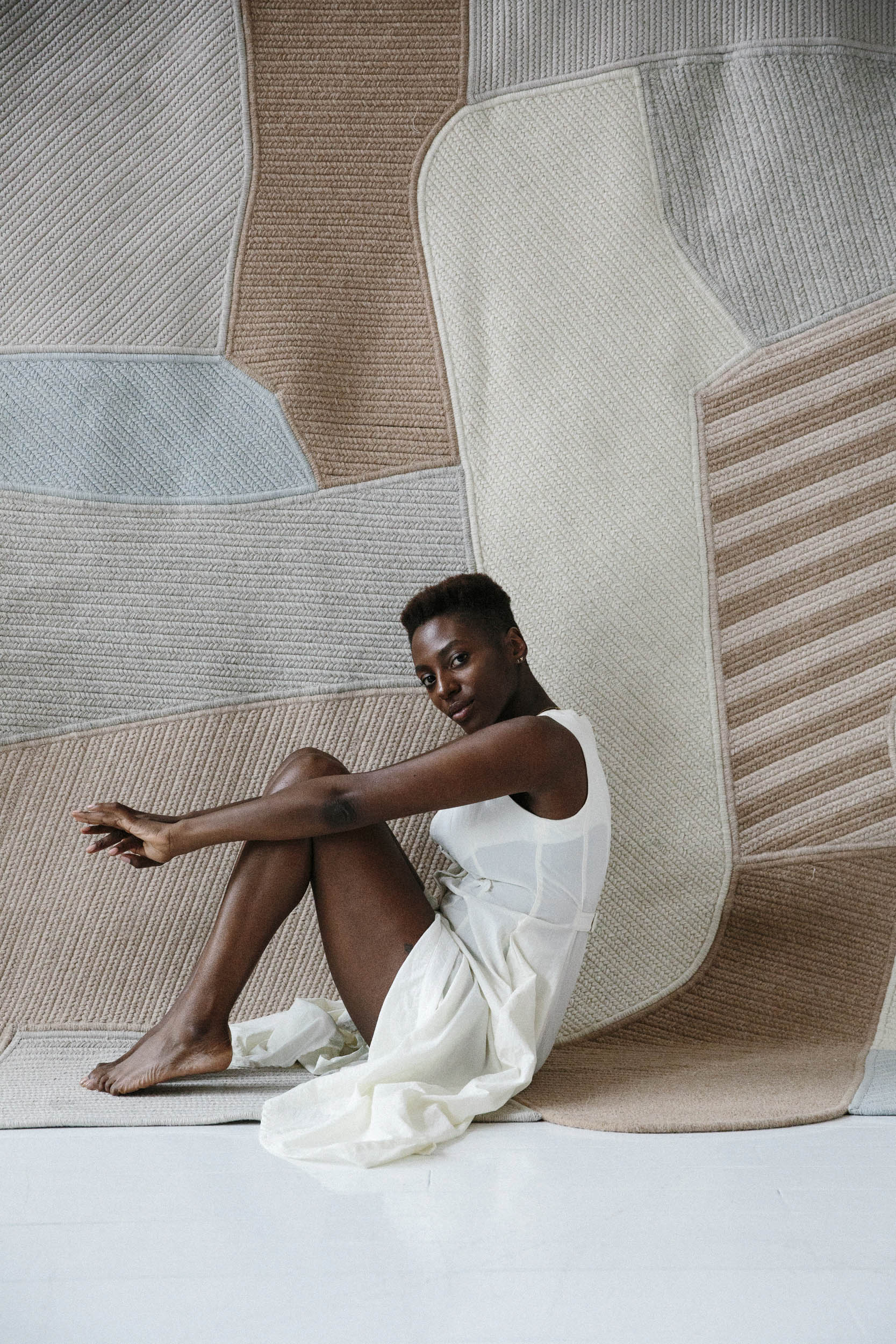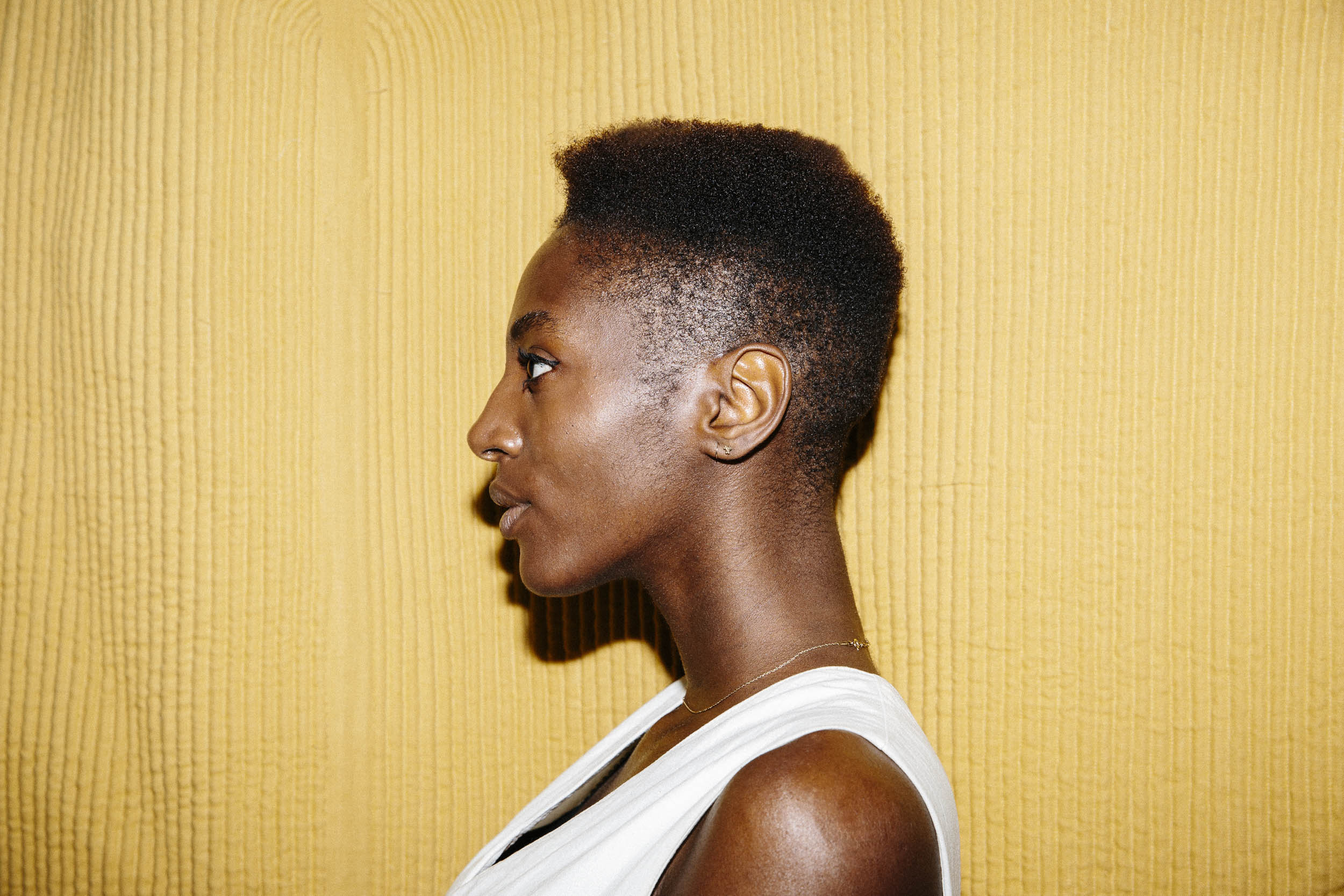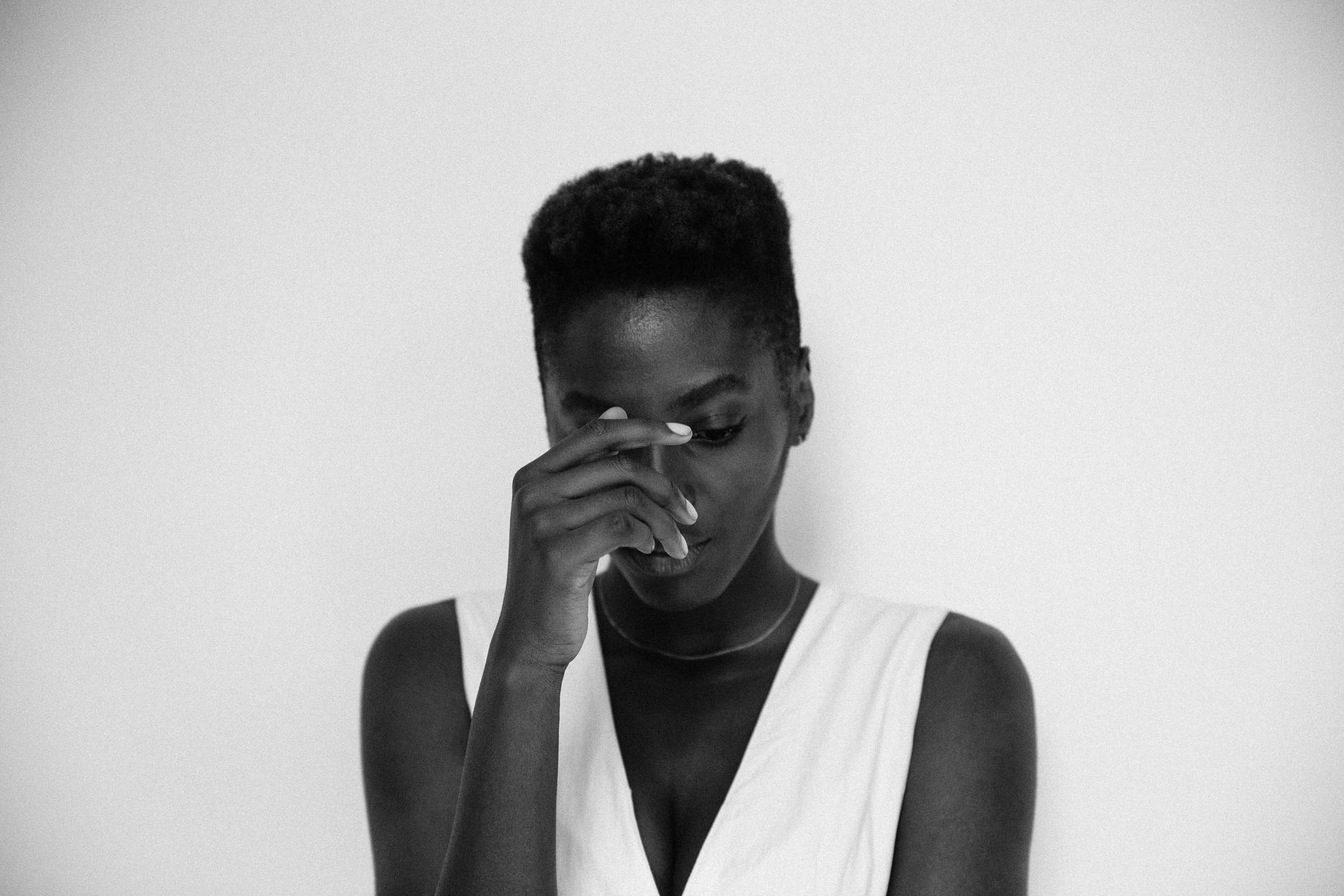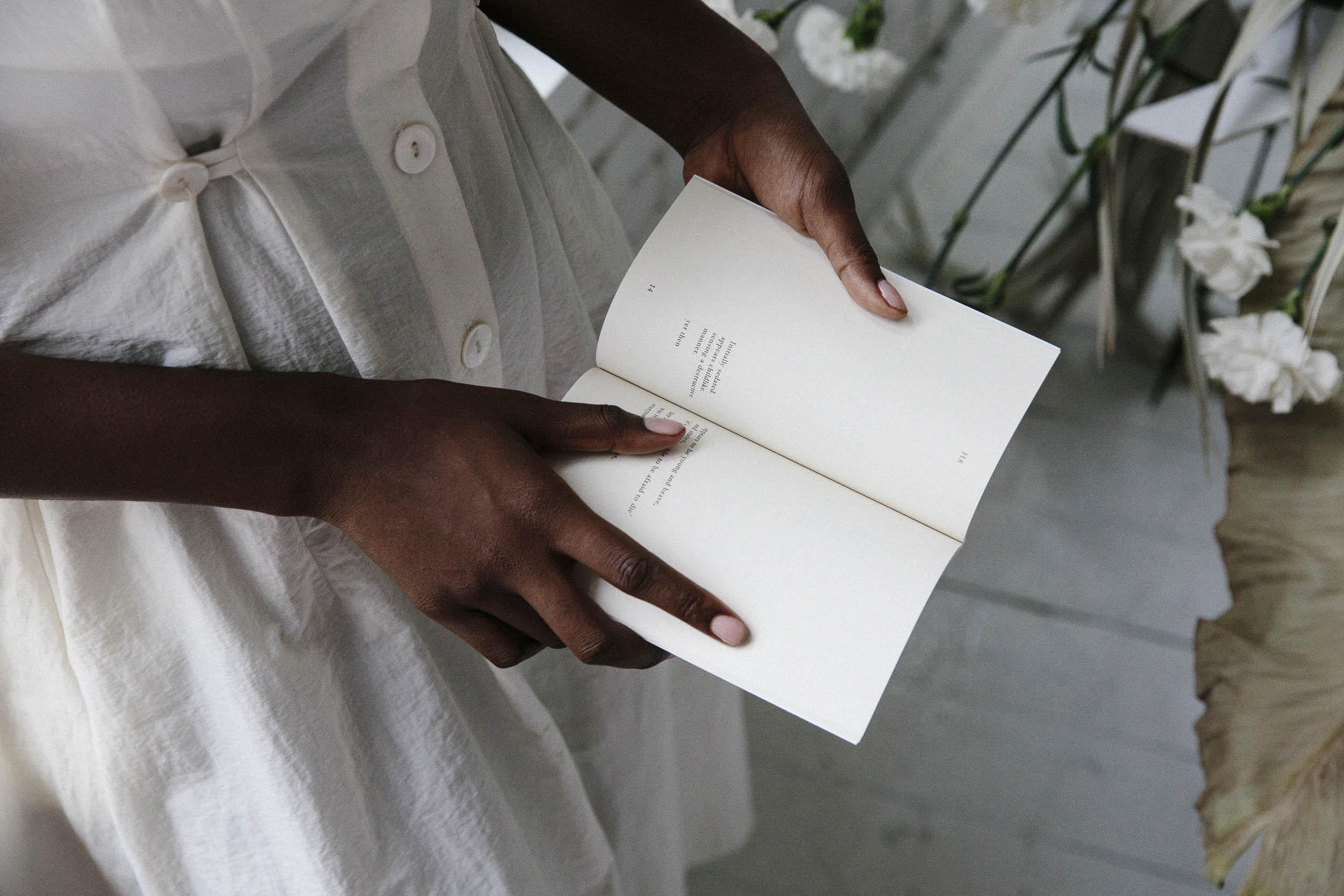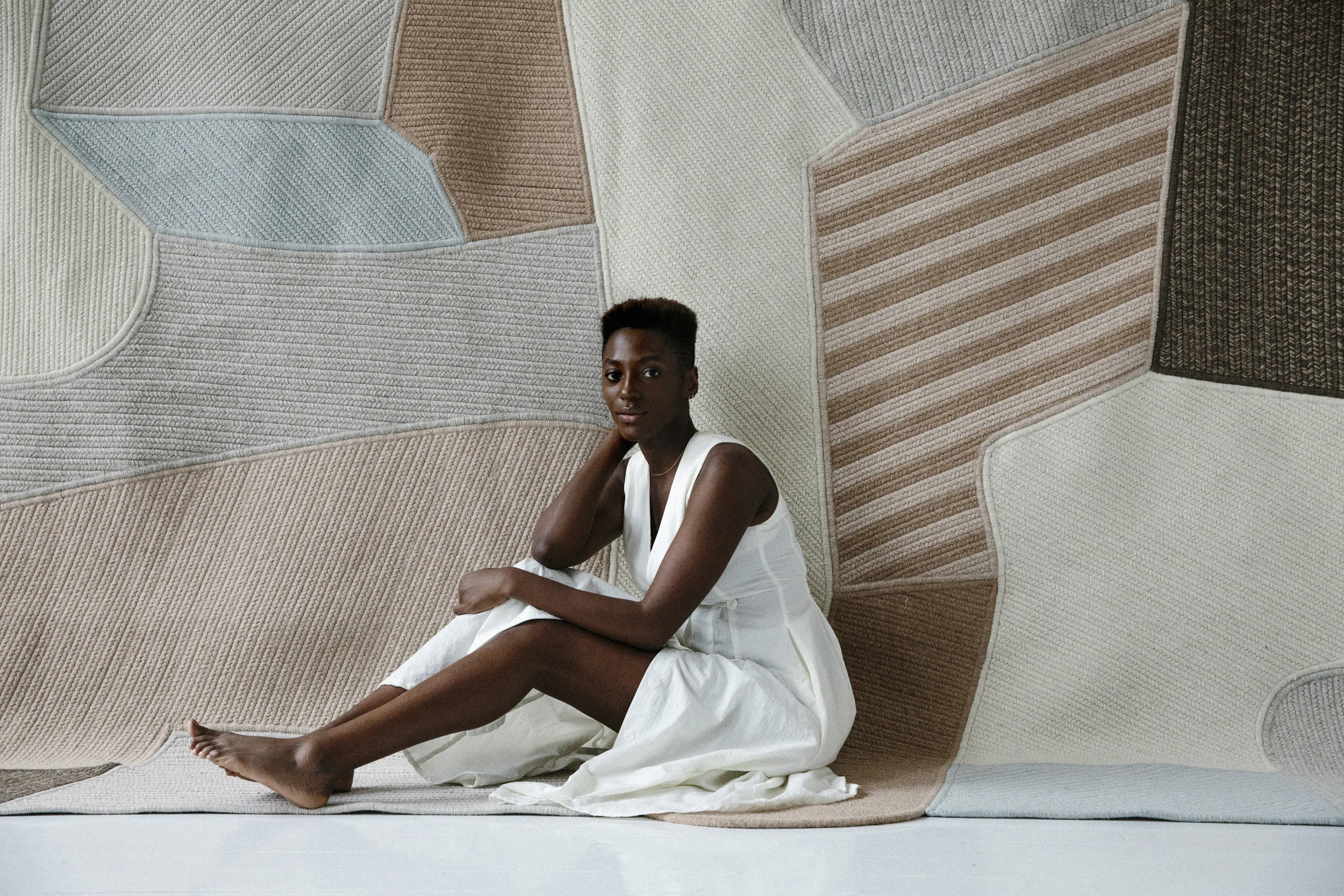
Yrsa
Daley-Ward
Yrsa Daley-Ward is a poet, memoirist, and actor hailing from Northern England. Yrsa’s lyrical, raw, and gritty memoir The Terrible is a powerful act of humanistic storytelling that sits with the reader long after she turns the last page. GAL interviews Yrsa about her creative process, acts of self-care, and what it means to read work written by other women. Yrsa’s stories about growing up, defining yourself, and finding connections in a wild world are not to be missed. The Terrible is on bookshelves today– make sure to grab a copy (and join GAL later this month for our live Q&A with Yrsa at Deep End Club!).
Photography by Laurel Golio
Space provided by Colony NYC
Wardrobe provided by Nikki Chasin
Girls at Library: What was the first book that you fell in love with that turned you into a lifelong reader?
Yrsa Daley-Ward: You know, I'm so, so lucky because my mum was an immigrant. She came from Jamaica at age 14. She was a single parent. And she impressed this need to read and taught me to read when I was super, super young. I was reading when I was two. She really advanced me, which I think you can do, actually, with most kids if you read to them, and if you give them advanced literature. I had this love and this excitement about any book. Any book. And we have everything. It's basically Jamaican family law to have so many books. We have encyclopedias, medical journals, everything from like, the Bible to the Kama Sutra to Mills & Boon. We have children's books as well, of course. But my mother used to read those to me. I think the earliest book that I remember her reading to me was The Little Red Hen.
GAL: And that’s how the second chapter of your book starts.
YDW: Yeah, yeah. My world was interspersed with all of this literature because we would read anything. I would read anything I could see and find, you know. I think for a kid that's really good, because if you read something that's a little too advanced for you, you start to understand people and grownups. You develop that kind of analytical mind, you develop emotional intelligence really young. And that's everything for a writer.
GAL: You're absolutely right. On page nine, you mention a book about a lion crying and destroying the jungle because he lost his comb. Is that from My Father's Dragon?
YDW: I don’t remember.
GAL: I think it is. When I read that line in your book, I thought I was going crazy. I thought I was one of the few people those books stuck with, despite the fact that it’s in its 54th year of print. I’d be curious to know if you are referencing that book.
YDW: That's incredible. Nobody else has recognized it. I'm gonna look it up now. Oh, that is where it comes from. I wondered where that came from. I was like, where am I picking this up? You know, 'cause I don't question it when I'm writing. It's almost like a weird psychic space where I remember things but I don't know exactly where they’re from, because I was a baby. Oh, but that's wonderful.
GAL: What’s your writing process like? Do you have a specific schedule? Do you have a favorite place to work?
YDW: Oh, I bloody wish.
GAL: [laughs] I hear you. It’s so tough.
YDW: I'm trying to establish it all the time. I'm really good at carving out other people's writing schedules when I do these one-on-one workshops with them, but not my own. It’s really important for me to start the day with writing when I'm writing. It's not very easy for me to tap into writing if I don’t start out the day that way. I try to change that because I want to be able to write whenever, but it's just—it's all in the morning. It's in the morning when I wake up and I try to do this thing where I feel really strong appreciation for everything. That keeps me going. I then go straight into the writing. The most important thing after I start writing is to not engage, to not speak to anybody on the phone. Social media is the killer.
GAL: It really can be. Do you ever do writing exercises to help get you going?
YDW: Yes. I do the process of free writing, so writing without engaging the brain, if you know what I mean. Without editing or looking at what you're doing. If I’m doing that for a good ten minutes I get a lot of poetry that way. It just comes out because it's something bigger than you when you're writing. You need to get out of the way. That's how it happens. I mean, there's no real other process. I think it's lovely when you can write somewhere beautiful, you know. I used to live in South Africa. I used to be so much more exciting than I am on this side of the world.
GAL: You're living in New York now, right? Is it your first time living in New York City?
YDW: It's the first time. I mean, I've spent whole summers here with my friends, but it's my first time living here.
GAL: I'm always interested to know how different creative people deal with the constant stimulus of the city. Does it feel like too much?
YDW: I have the opposite thing going on. I live by myself so I live in a lot of silence. I need a lot of silence. I don't own a TV. Everything is super calm and I stay in a lot. I live in a really, really leafy part of Brooklyn. It's so quiet. All of that offsets the noise. So I might only be among the madness a couple of days a week. And most of the time, yeah, I'm just in this space with my plants and my diffused light room. Everything is super, super calm because I need that. I spend loads of time out in the country, too. I wouldn't be able to handle living here full time like that without breaks. The noise, that kind of noise ain't so good for a creative.
GAL: On page 140 of The Terrible, you say, "None of us can play house well." Has that changed at all since writing this book? Is it important to you to keep a house? Or to have roots?
YDW: No. I've moved around a ridiculous amount in my life, so I can't. I've now been in NYC since New Year's Day. It's important to curate the sort of space where you would you feel calm, and that holds you, and I have that. I'm looking forward to a little bit of, dare I say, stability with it? I'll still be out of the country for over half the year, but it's nice to still have this space. Yeah. I think it's important. I think it's important, you know. To have some sort of base.
GAL: How did you decide which events to include in your memoir? Was it a difficult process?
YDW: You know what, I did not. I'm quite indecisive at times, so I can't engage my brain too much when I'm writing. Which sounds really strange.
GAL: No, it doesn’t. I think I know what you mean. Can you explain it a bit?
YDW: I just wrote what came out. And there was other things I thought about after the fact, but you know, I'm not a huge editor when I'm writing. You should probably bring this up [laughs]. I don't have that kind of attention span and I don't like spending ages on things. I'm real impatient and I'm really impulsive. I wrote it as it was and then submitted it. I'm never going to be the type of person who can edit for months. Which I really admire, but I can only spend a few months on the book tops. And then I can't really keep coming back to it. Also it's a memoir, and a lot of the content is really gritty [laughs]. So you don't wanna be sitting over it for 20 years, you know?
GAL: Yes.
YDW: You want to make it and then get out of there and then get it out and then move onto the next on, you know?
GAL: I really respect that you're not super precious about it. I think it takes a lot of strength and self-determination to not be precious about your own creative work.
“I feel like there’s more of a purpose. And I think some idea of purpose, no matter what it is, it’s just grounding for me.”
GAL: Does The Terrible exist in us all?
YDW: I think so. I think so. Because I think it's just a euphemism for so many things, you know. It's so many things. It's depression. It's anxiety. It's addiction. You know, it's eating disorders. It's fear. It's trauma. It's shame. It's all of those things. You know?
GAL: I do.
YDW: Cause you know, we’ve all got a lot of that [laughs]. In some form or another.
GAL: Do you feel a strong sense of belonging more so now that your work has garnered such success?
YDW: I feel like there's more of a purpose. And I think some idea of purpose, no matter what it is, it's just grounding for me. You know, when I had kind of been careening through life, it was difficult. Feeling at sea, along with all the other anxieties. The stress that we have is really difficult. So yes. Yes and no. I mean, we still have those things. It's still life. You still have to make the best of it, and you still have to program yourself each day and look after yourself and relearn. But absolutely. Absolutely. Yeah. It does something. [laughs].
GAL: It does. Good things, I hope. Does the audience reaction matter to you? And in what sense does it matter to you? Or how does it affect you, if at all?
YDW: I tour a lot, and I love it. I go around a lot. I do poetry and speaking events. Stuff like that and I adore it. And people are so lovely and brilliant. I cannot divorce myself from reviews and what people think, although I hope it largely goes on to help people feel less isolated, because when I write, I want to be of service. That's the most important thing. But no, individual reviews from bodies and literature—for me, I have to not take any of it too personally. Whether it's good or whether it's bad. It's just a piece of work. You know? Eventually it will be another piece of work. You know?
GAL: Yes, it will.
YDW: You've got to stay healthy. My opinion of myself and what I do can't be tied up into what anybody else thinks especially not for something that's so revealing and so true. It's a true story, so people can have an opinion, but it's not… [laughs] It can't matter to me that, no, I don't think that that would be so healthy.
GAL: What is the power of story? Can you describe some ways in which fictional narratives have impacted you in your life?
YDW: Oh. Definitely. I mean, it does and it continues to. You know, I grew up and I read books like The Color Purple. By the Light of My Father's Smile. Oranges Are Not the Only Fruit. I Know Why the Caged Bird Sings. Stories that give voice to experiences of women that look like me or have similar experiences. That's gold for someone who wants to write because then you realize your story is valid, you know. You realize your story is important. You know, when I was a lot younger, I used to read a lot of what you call, I guess, mainstream classics. White fiction. And when I started to craft stories, as I have from a young age, I used to write stories about people that looked nothing like me because that's what I saw, you know. Those were the stories I thought were acceptable. But as I got older and started to see, Oh my God, no. Women from this background, the women from this race or of this sexuality—everyone's story's difficult, and it's how it's told. Everyone's stories can reach you. If I can, you know, read a Truman Capote story and feel moved, of course somebody else can read mine. So you just sometimes don't think that, if you are Black or if you are from a community that isn't as visible. But when that happens it's really wonderful. And it's affirming, and I hope that my stories can do that for other people, or poetry, or whatever it is I make, you know.
GAL: Yes, it is and it clearly does. How do you choose the books you read?
YDW: Oh. God. Do you know what I've started to do? Now with these plane rides, bloody plane rides, oh, my God. Now I'm obsessed with audio books because when I'm half awake, when I'm tired, when I'm going through the airport, wading for the millionth time through security or whatever, I've been listening to audiobooks just one after the other. And it's a great way to read when you just don't feel like actually physically reading. And you hear it and it's beautiful. So I do that and that's how I choose. I've tried to choose books that I wouldn't normally pick up now. Just because you want to be rich, you know. You want a real good understanding of different types of writing, not just your demographic. I want to read so many different things. So that's how I choose it, and look, I go into the bookstore. Greenlight Bookstore is in my area. And I just go there and see what looks exciting. Independent presses and all that kind of thing. That's how I choose.
GAL: How do you feel when you're in a bookstore trying to choose? Is it like being in a candy store?
YDW: Oh, I love it. But since I was a kid, shopping for books is just—oh. It's just amazing. I love books. The color of them. The shapes. You know. I love everything about books. So it's a sort of pleasure. It's hard to choose.
GAL: It really is!
YDW: And then you want choose—what? I don't just want to choose the political book or the book that like, everybody's talking about. It can be difficult, you know. It's so wonderful, though. It's so wonderful. 'Cause they're my favorite things.
“it becomes really important to give voices and strength and also to act as a bridge so we don’t feel so alone in our experiences. ”
GAL: How does it empower women to read women?
YDW: I think first of all, you're empowered when you realize that no situation is really new. I mean, even what happened with the #MeToo movement. We wouldn't have that if people hadn't started talking about it, about their experiences. So it becomes really important to give voices and strength and also to act as a bridge so we don't feel so alone in our experiences. So it's something I feel strongly in talking about them, because off the back of [#MeToo], there's been so much literature, so much film, so many things penned. Because of that, because people are starting to speak about it. And oh, women writers. You know? Incredible. Incredible. They've shaped me and made me excited about what I do.
GAL: Will you share some of your favorite poets with us?
YDW: Yes. It changes every month, because there's just so many brilliant poets. Haba Akbar. Danez Smith. Sam Sax. A beautiful poet called Natalie Safir. Anastacia-Renee because she's incredible and she's somebody I only found last year. Oh, my God. Anastacia-Renee. But there are so many. So many.
GAL: Do you read a lot of nonfiction? Do you prefer nonfiction to fiction, or is poetry your favorite genre?
YDW: No. Fiction is definitely my favorite genre. When I originally started writing The Terrible, I thought I was going to write a book of fiction. But then the truth came out and there it was.
GAL: You use the color red constantly in The Terrible. How do you feel about the color red?
YDW: It's actually one of my favorite colors. I love to wear red. If I can find a red dress, I'm happy. It's just such a bold and primary color, you know? And it's the, the primary-est of primary colors, I think.
GAL: Because of how it's related to human bodily function, or …?
YDW: Well, you close your eyes, you see red, you know?
GAL: That's true.
YDW: Your blood is red. Your heart. Or your insides usually are red.
GAL: Yeah. A color of existence.
YDW: So it's a color that underpins everything, but it’s interesting–in nursery rhymes and books, we also see it as a color of danger, a color for stop. Which is why I think it's really important. When I was a kid, you know, my favorite color was yellow. And I did think of red as this interesting, dangerous color. You know. As beautiful as it is.
GAL: What color are you drawn to right now?
YDW: Oh. I'm so drawn to pink. I'm drawn to like, fuchsias. Hot pinks. And I hate to be so typical, but if there's an accessory, like if I’m at Sephora and there's an accessory that comes in lots of colors, I'll definitely get the fuchsia one. I love Barbie pink, and I love millennial pink, and I love blossom pink. I really like pinks. Yeah. I just don't wear it. I don't like it for clothes. But I like it for things.
GAL: For details.
YDW: Yeah. Definitely.
“I think you have got to fill your spaces with beautiful things. You’ve got to cut out the negative influences. Those people who are taking too much from you”
GAL: We have a friend who has something called a “Sanity Shelf,” which is dedicated to books that she returns to again and again to reread for pleasure, knowledge, and solace. What books would be on your Sanity Shelf?
YDW: I would have two by Jeanette Winterson. One is Sexing the Cherry, which I adore. I adore, I adore, I adore, I adore. I think it's amazing, just because it's mythical and true and not true and oh, it's just amazing. I would also have Written on the Body by her because it's just one of the most beautiful and true books that I've ever read about love. What else would I have? I really, really, really enjoy Anastacia-Renee at the moment, so I have a book of hers called Forget It. I would have that. Claudia Rankine. Don't Let Me Be Lonely. Definitely The Complete Stories of Alice Walker, which has “In Love” and “Trouble” in it. The Color Purple by Alice Walker. Toni Morrison, The Bluest Eye.
GAL: Have you listened to Toni Morrison on Audible?
YDW: Oh, my God. Yes. I listened to Sula.
GAL: Doesn’t it just kill you?
YDW: It kills me. She’s incredible. I mean, there's nothing like the author reading their work when they can read well like she can.
GAL: Anything else for the Sanity Shelf?
YDW: Yes. I'd have either Go Tell It On the Mountain or Giovanni's Room by James Baldwin. Your mind goes black when you do this. I love um, I'd actually have a Spike Milligan book and a Roald Dahl book as well because they're like, some of my earliest poetry influences.
GAL: Oh yeah! Which Roald Dahl books do you like best?
YDW: I would say James and the Giant Peach.
GAL: That one is so magical.
YDW: It is, and the poetry in it is incredible. I think that's the one. But I love Matilda. I love The BFG. I love loads of them, but I think it's gotta be James and the Giant Peach. Just for the way that the poems are dispersed throughout.
GAL: How do you avoid creative burnout? How do you practice self-care?
YDW: I think that you have to, you know I keep going on and on and on about like, the need for life balance. I think that you have to open yourself up to you know, whatever it is. But let's say you're busy. You're like, super busy and you're flying all around the place, or either you're busy trying to do like, the nine to five and it's actually eight 'til nine or whatever. I think you have got to fill your spaces with beautiful things. You've got to cut out the negative influences. Those people who are taking too much from you, and things that you don't really want to do because I think we always, as women as well, do a lot of things that we don't want to do. I still find myself sometimes going into like, automatic ... You know, someone goes, “Oh, you're in London. We must meet.” And you're like, “Yeah. Okay. Let's meet.” And I think actually you don't have to. Like, stop trying to make everyone happy.
GAL: Completely. You have to protect your time.
YDW: You've got three days in London. You can't see 26 people.
GAL: Yikes!!! Definitely not! That’s too much to squeeze in a whole month.
YDW: But we allow feelings of guilt to wash over us, and so we end up agreeing to a lot of things we don't want. I'm really trying not to do that, but it is difficult. But as your plate gets fuller, I guess you're left with not a lot of choice. But I think that's really important to understand what, you know, if something doesn't feel right, you can trust in your instincts. And giving yourself a lot of space. A lot of quiet time if you need it. And, and then conversely, if what you need is more people, not being afraid to like, really um, um, tell people that and making time to see, to see your friends, and making time to see people and, and, and having people that love you and support you around you. A touch, you know. And love. Love in your life, which is, is the, is the most important and you know, transformative thing.
GAL: It really is the most transformative thing. Do you have a favorite word right now?
YDW: This is gonna sound so bloody cheesy. It’s because of what's happening at this moment in life. I think it is friendship. I choose friendship because I'm understanding it in different ways at the moment. You may think of friendship as one thing, and actually I'm starting to understand friendship as this, this love letter, this spectrum, because you can love somebody in so many ways. There are so many ways to be in love or to love, and it's interesting to think about alongside the ideals that we have about what love should be. But you know, the foundation for any kind of really beautiful relationship is a friendship of sorts. And that can be anyone from your mum to your partner. It's really important. So I want to say that. I want to say friendship.
GAL: Thank you. I love that explanation. Our last question is another tough one to nail down: would you please name just three books that you recommend reading and the reasons for your choices?
YDW: Wow. For the readers.
GAL: Yep, for the readers.
YDW: Oh god.
GAL: You know, we can do a check in later this year or in 2019– these choices can change in the future.
YDW: Okay, good. So I'm not tied to these. I want to say The Bluest Eye by Toni Morrison is a heartbreaking tale about self love and hate and then, self love and race. And, oh God, identity and childhood. I would also say The Four Agreements. I think any book that teaches you, or that informs you about humanity and how to find the best in yourself when it's hard, is important to read. We live in the city. There's so much going on. Sometimes it's hard to find that best self, you know. That high self within us because there's so much going on to flatten that. So I think a book like that. Oh god. And now the last one. [laughs]
GAL: If you want, I'll give you a kind of out. You can name one more physical book or you can name two audio books.
YDW: You know, why don't I look at my own collection? Oh. That could help me. Oh. This will help us. Hold on, it’s loading. I really love books that are richly poetic as well, you know? I mean, I didn't intend The Terrible to be how it is at all.
GAL: Really?
YDW: I thought I was gonna write it strictly in narration, but you know, it comes out how it comes out. Okay. I'm loading up my library. Because this, these, these are my Kindle books. Oh God, I've got so much here. Written on the Body is just gorgeous. There's a book called Sonata by Jackie Kay. It's a single story in a book, a Picador Shot– a short, tiny book. I read it one summer in the park and it was the most magical day ever. It was incredible. I also read a lot of plays.
GAL: Do you? Which ones?
YDW: Yes. I read a lot, 'cause I'm an actor. A beautiful play, People, Places & Things, and another one called Grounded. Both are incredible books.
GAL: You’re naming so many good ones! Don’t stop!
YDW: I also love bell hooks' book. All About Love by bell hooks is one of my all time incredible favorite books. I need to read more by her. But yeah. Those are the ones.
GAL: You are the one, Yrsa. Thank you.
Get Yrsa's latest novel The Terrible, out now through Penguin Books.
If you haven't yet, also pick up Yrsa's book of poetry, bone.
As you may know, The Terrible is our first GAL Book Club pick!
Don't forget to sign up for our Book Club here and join us at Deep End Club, June 21st from 7-9pm for an IRL conversation with Yrsa.
Featured Books
More Like This




